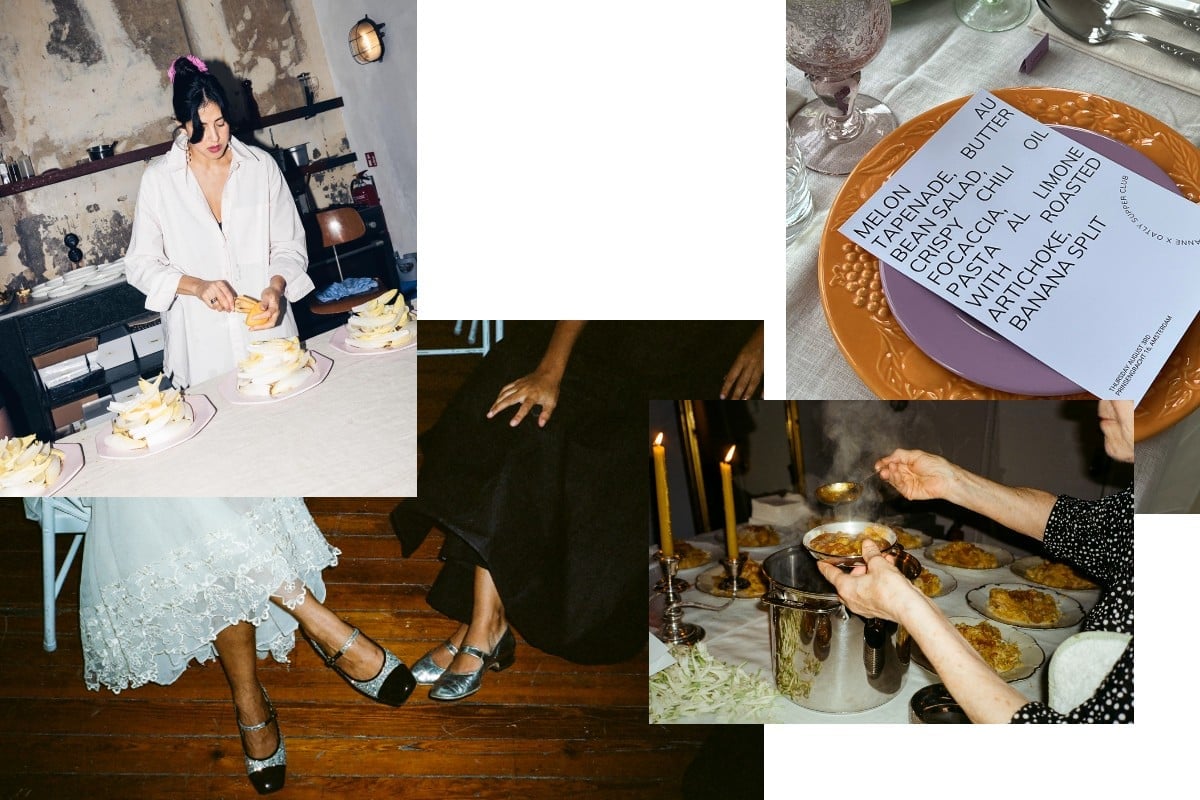
There’s nothing I love more than random bonding moments with strangers, usually over a shared experience with a concrete timestamp. People sweating it out next to you in the sauna, the characters you encounter on holidays and continue to randomly bump into over the course of your trip, or the holy social welding agent that is standing in line together for the bathroom at a club. To fulfil this desire for connection further, enter the latest trend in dining: The supper club.
Supper clubs aren’t a new phenomenon—they originated in Beverly Hills, California in the early 1900s—nor are there any really strict guidelines as to what constitutes one. The term is used as an umbrella for any ticketed dinner party that exists outside the traditional restaurant format, and they can be held anywhere from living room tables to rented event spaces, and sometimes even in restaurant spaces themselves. Hosted by home cooks rather than professional chefs, they’ve witnessed a renaissance around the world in recent years, with people looking to connect and build community after the pandemic. While the days of social distancing and silly little walks feel like a distant fever dream, the rise of supper clubs is just one of many trends to have emerged post-lockdown, and it’s only gaining more traction as an interest in home cooks, tablescaping and food art increases, too.
Amsterdam-based chef and food artist, Julia Khan Anselmo (aka Feisty Feast), has long been aware of the magic that happens when strangers come together to eat. Fusing food and feminism, she launched her dinner series out of her living room over a decade ago, and has since hosted them in breathtaking venues around the world, from Vancouver to London. Each event centres on an important and often under-discussed topic—from the identity crisis of motherhood to ageing with pride—and guests are served a family style menu alongside inspiring talks from guest speakers.
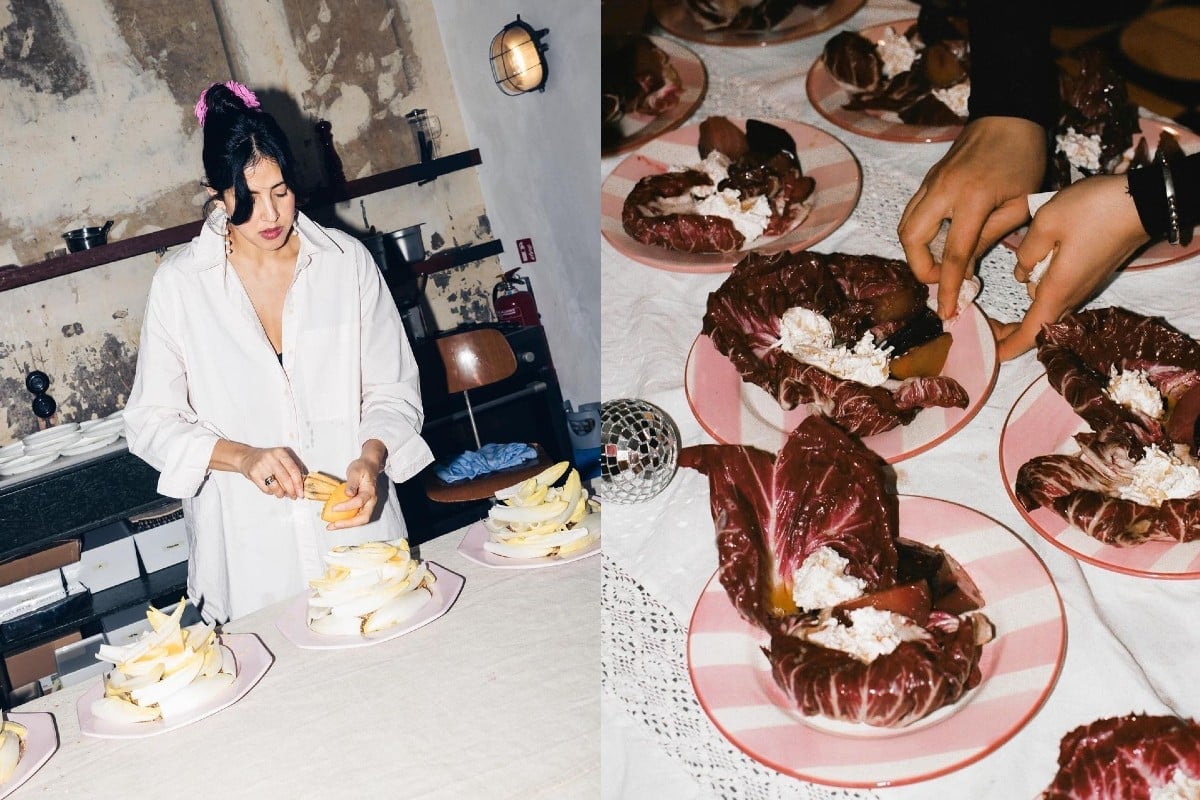
Image credit: @feisty_feast
“I began Feisty Feast because it was a culmination of everything I loved to do and couldn’t help myself from doing and thought I was good at,” says Julia. “Food is something we all need in order to live and this is a very basic fact of life that connects us all. It is also one of the most pleasurable acts of life. I think people are more open and receptive to one another when we are engaging in such a simple and necessary ritual of life; it’s the best reason to gather. Feisty Feast is really an expression of joy, beauty and connection”
While her events are invariably elegant and awe-inspiring, serving flavourful food and facilitating connection between guests are Julia’s foremost concerns as a host. “For Feisty Feast events, less is more,” she says. “A simple tablecloth, menu flowers and candles. Plenty of space for big sharing platters of food to be set down and guests to easily share amongst one another is most important. The focus is less about pretty things on the table and more about the connection between guests.”
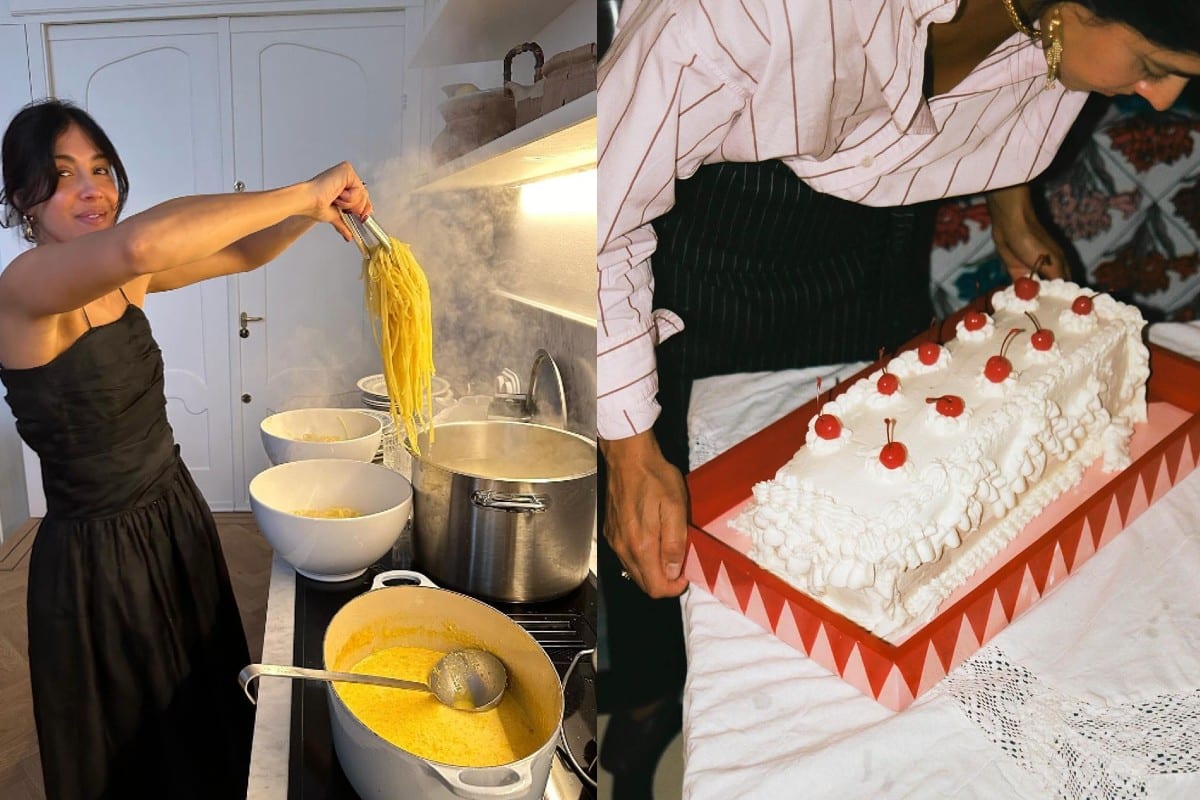
Image credit: @feisty_feast
“I think supper clubs offer an intimacy and exclusiveness that a restaurant can’t,” says Julia, when asked why she believes there’s been such a trend towards communal dining. “There is an appeal to an event because they only happen once and they are unique, unlike a restaurant where diners come on a regular basis. Everything is new and temporary. With a pop-up dinner or event, the beauty is in brevity and a fleeting energy that a traditional restaurant experience doesn’t offer.”
Dinner and a dance was on the menu at the most recent supper club I attended. Thrown by friends of friends, the idea behind the ongoing supper club series, Sonder, is to remove the hassle of having to leave a dinner party in search of a party party, bringing all the fun under one roof instead. At one point in the evening, tables were dismantled and discarded to make way for the dance-floor—a sight that struck joy into the heart of this ageing millennial, who usually starts to lose steam around the time dessert plates are cleared and the ‘where to next’ discussions take hold.
It’s this kind of novelty factor that Michaela Johannsen, self-taught chef and founder of Sydney-based catering company, Aplenty, credits with the increased appetite for alternative ways of dining. “There's always a level of surprise involved with a supper club, which is exciting. People can expect the unexpected,” she explains. “Maybe it’s held in an obscure space, or there's an interactive moment, or there's a DJ performing at the end. Supper clubs are different to the restaurant experience in that they bring to life a creative vision that goes well beyond just the food.”
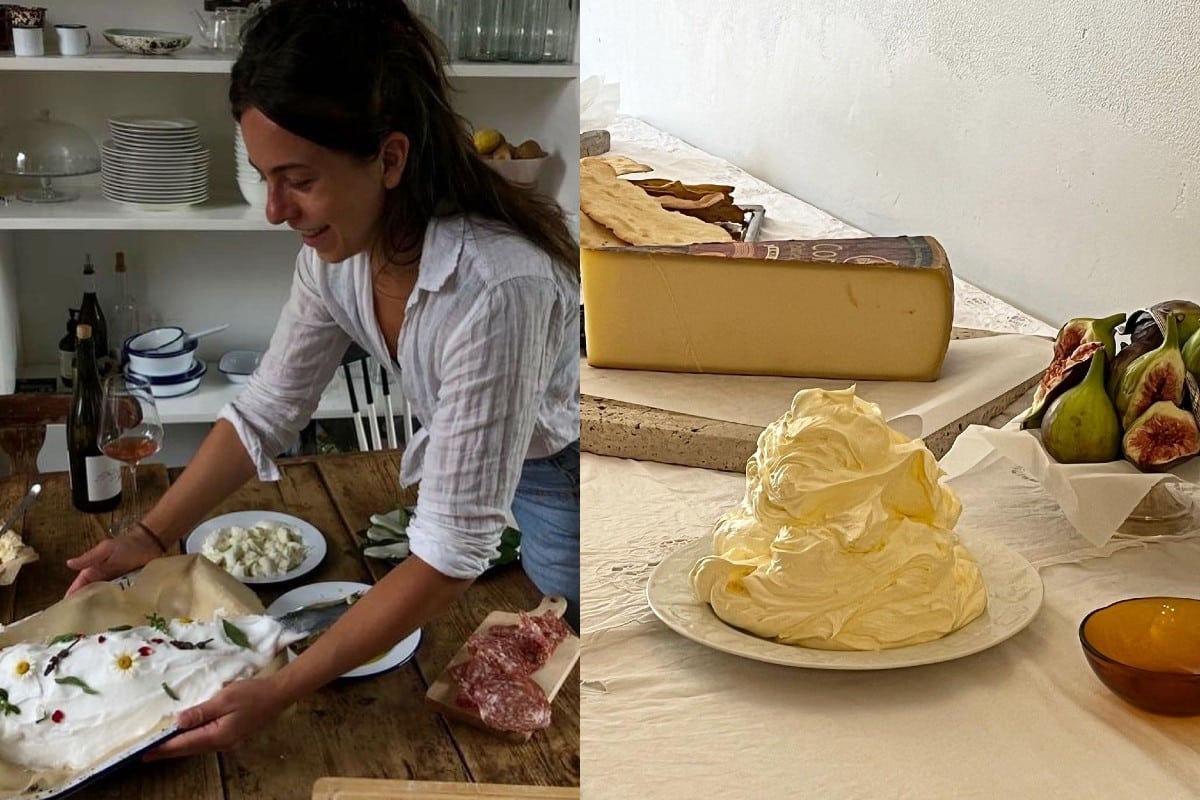
Image credit: @aplentyfood
Michaela launched Aplenty in 2020 as an events and catering business but quickly pivoted to selling pasta and picnic boxes in response to the pandemic. As the lockdowns eased, throwing supper club-style dinners in their Redfern space was a way for her to redefine what Aplenty was, giving people the opportunity to sample her seasonal, fuss-free and Mediterranean-inspired food in a casual setting. It was a successful move: Aplenty is now the go-to caterer for Sydney’s fashion industry, with Michaela and her team regularly working on events for brands like Maggie Marilyn and Fella Swim. Their schedule is booked full with weddings until the end of 2024, and their monthly supper clubs consistently sell out shortly after being announced.
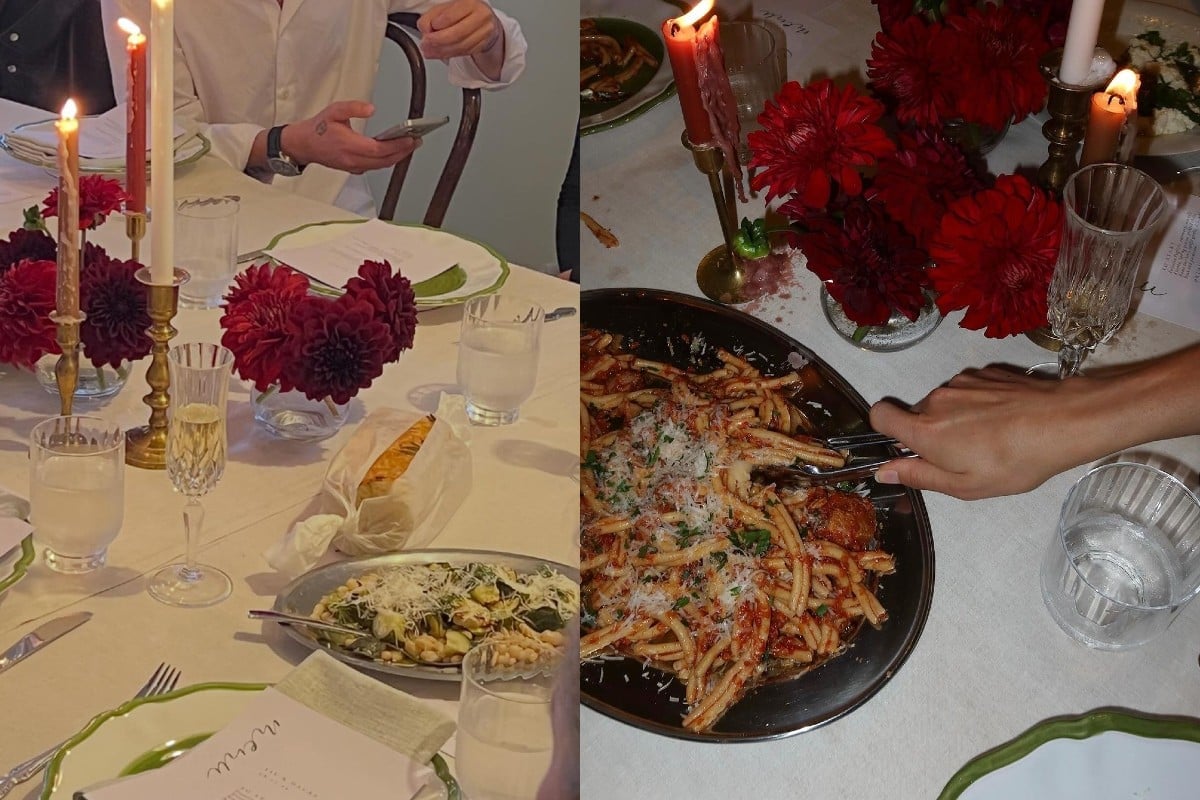
Image credit: @aplentyfood
The Salon, a NYC-based dinner party series hosted by fashion and textiles designer, Kritika Manchanda, and food stylist, Ananya Chopra, was also created in the aftermath of the pandemic, albeit for different reasons. “COVID-19 highlighted a growing need for community among New Yorkers,” says Kritika, who holds the dinners in her Noho loft around a long communal table that seats up to 30 people. “We felt that a sense of warmth in hosting was missing from the New York dining scene, which can often feel stressful and rushed and devoid of the intimacy of a home-cooked meal. We wanted to create a space for people to come together in a way that felt natural... a coming together of ideas and energies.”
Along with a shared love of hosting dinner parties and the Indian food of their childhood memories, Ananya and Kritika find inspiration in the historic tradition of salons. “Salons were originally private gatherings hosted in the homes of individuals, often women, where artists and intellectuals could come together to discuss literature, politics, and art,” Anyana says. “We aimed to create a similar intimate gathering of creatives, artists, and entrepreneurs, where they could come together while enjoying an authentic Indian meal — think of a traditional Mehfil. Through these dinners, we’re creating a sense of community and belonging, while also celebrating the diversity and complexity of Indian cuisine and culture.”

Image credit: @umafodar
The duo usually begin concepting their menu two weeks in advance, drawing on the simple yet richly flavourful food they grew up eating. Everything is made from scratch—from ghee and butter to khoya and paneer—with the pair sourcing fresh produce from farmers markets and other ingredients from specialty stores and a community of trusted South Asian grocers they’ve been frequenting for over a decade. “The right ingredients make all the difference in the world,” enthuses Ananya.
For Ananya and Kritika, the tablescaping element of the evening is just as important as the food they serve. “We love throwing parties and especially love the fanfare around setting the table,” says Kritika. “Every detail is considered and intentional. Our dinnerware—a collection of vintage pieces acquired over the years—is a mix of brands like Limoges, Hutschenreuther, Herend and Ginori.”
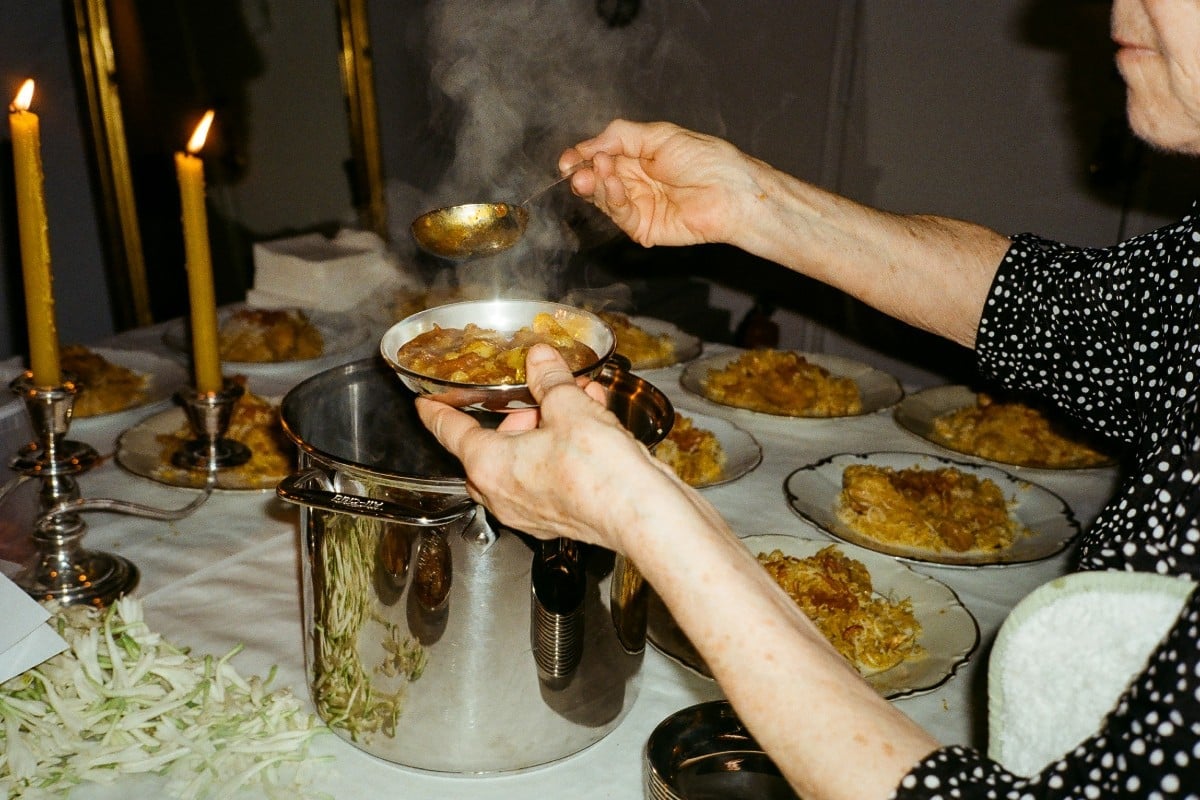
Image credit: @umafodar
Oftentimes, these two elements intersect, with Ananya and Kritika creating edible décor designed to be touched and played with before consumption. A way to disarm and delight, and a gratifying experience for any grownup who was scolded for playing with their food as a kid. “We don’t want things to be too rigid or precious—it should feel immersive and fun,” explains Ananya. “For one of our recent dinners, we made a beautiful rose jelly in the palest of pinks, which was delicately placed on a row of betel leaves.”
Whether edible spectacle or banquets served family style, food as connection is central to Aplenty’s philosophy, too. “At a recent dinner, we made a salt baked fish and got one person from each group to have a go at cracking open the shell of the fish—it was a fun moment and a talking point that brought a group of strangers together,” says Michaela.
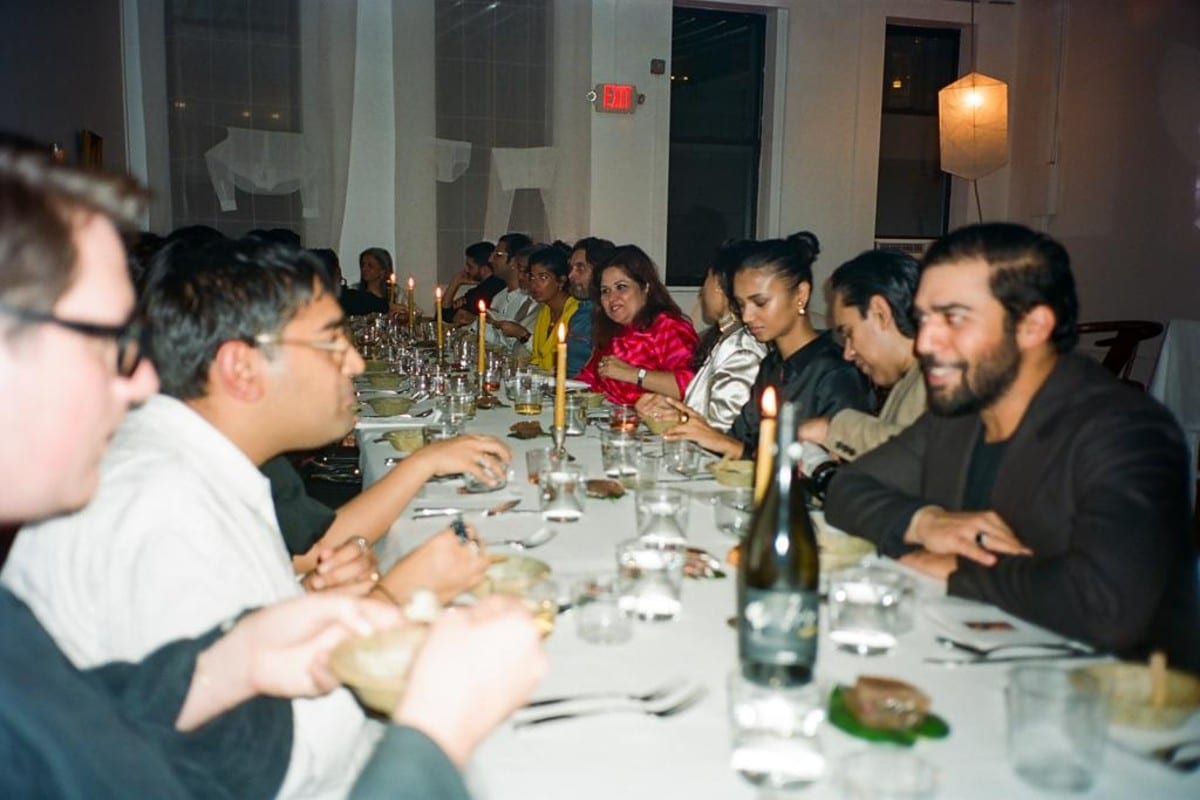
Image credit: @umafodar
A veteran of supper clubs, Helsinki-based home cook, Emma Rane, hosted her inaugural dinner back in 2017 out of a “curiosity to meet new people in my city” and more specifically to convert online friends she’d made through her food Instagram into real-life pals. At the time, she was living in a 23 sqm apartment, “awkwardly tiny for hosting 8 people” by her admission, with some guests even bringing their own chairs, but believes the unconventional setup only added to the magic of the night. Her dinners have largely outgrown her dining table—except for the odd supper club she hosts at home—and are now popping up in spaces throughout Europe, from restaurants and bakeries to ceramic studios and homewares stores. In fact, it was at one of Emma’s tables in Amsterdam that I was first introduced to the concept of a supper club.
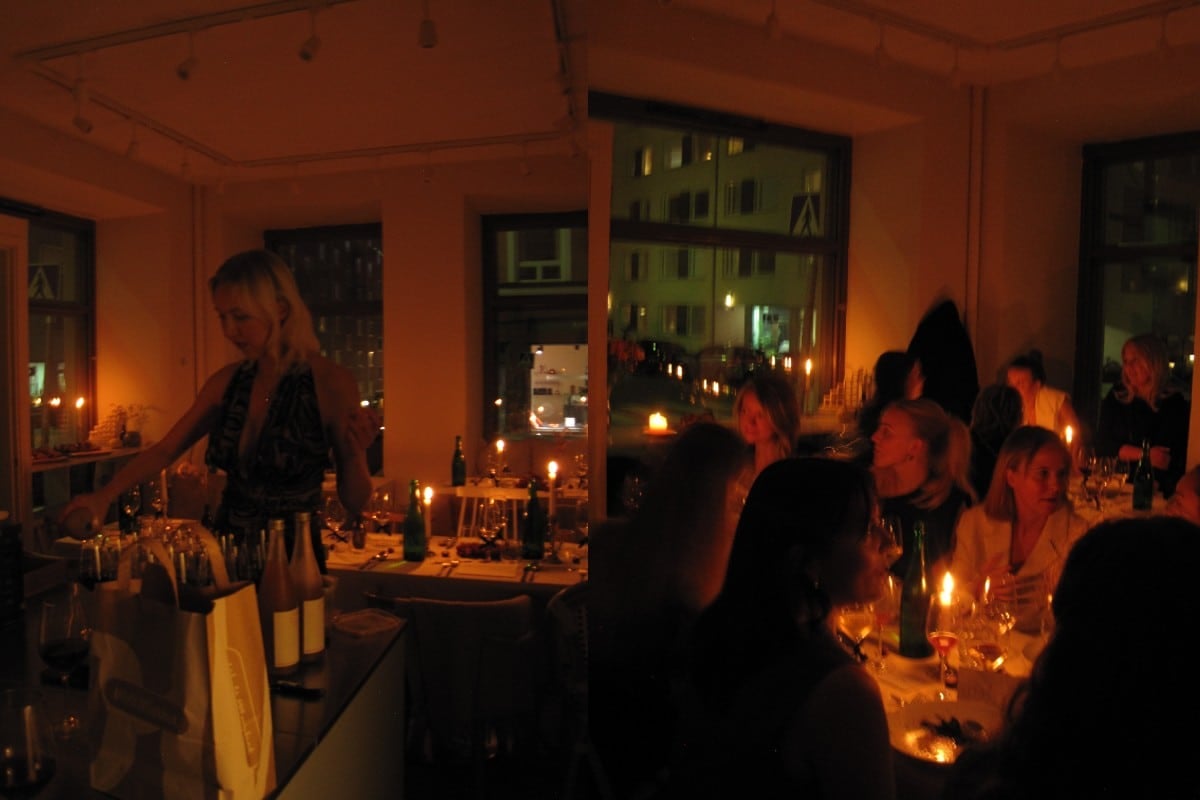
Image credit: @emma.rane
The ongoing COVID-19 lockdowns ruined a few things that I’d previously held dear. Long aimless walks around the park, board games and all board game-adjacent activities, my couch, and, most crucially, intimate dinner parties with friends at home. It was a testament to the idea that overindulging in a good thing can completely decimate any shred of joy you once derived from it.
After the last lockdown ended and the world began to re-emerge, I launched myself out of the four walls of my apartment and into a phase that can only be described as “spendy”, where all I wanted to do was funnel my money straight into the pockets of dimly-lit small wine bar owners everywhere. To eat with friends. In public! There wasn’t an obliquely-named small plate—usually involving a braised root vegetable, blob of burrata or anchovy—or an overpriced glass of natural wine in the entire city of Amsterdam safe from my want. The small plate fatigue inevitably settled in (see above notes on too much of a good thing), coinciding with a grim financial landscape known as the ‘cost-of-living crisis’. As the plates got smaller and the bills grew bigger, trying to Girl Math my way out of spending upwards of $100AUD to leave dinner feeling a little peckish was no longer viable. Looking to rekindle my love of dinner parties and socialise in a more mindful and novel way, I signed myself and a friend up to attend a supper club co-hosted by Emma and Polish home cook, Zuzia Batolik. Held in vintage tableware brand, La Louème’s, colourful space, the evening was characteristic of both Emma’s cooking and hosting style, with a 3-course Italian-inspired menu served up in a warm, welcoming atmosphere.
While I’ve always managed to drag a friend along to the supper clubs I’ve attended, I wondered how hosts ensured solo diners felt at ease. “Hosting is such a big part of our culture that [making people comfortable] happens very naturally,” explains Kritika. “Guests set the tone themselves, so the energy of each dinner is unique, but they’re always warm and welcoming. The fact we are literally hosting in a home setting also adds to it. You will find guests hanging out with us in the kitchen or smoking on the fireplace as one would at a friend's apartment.”
Emma concedes that “starting a conversation with someone new can be intimidating for many adults” but sees the supper club as the perfect format to do so. “You have that reassurance that everyone is there to connect,” she says. “Since most people come alone, it puts everyone on the same page from the start.”
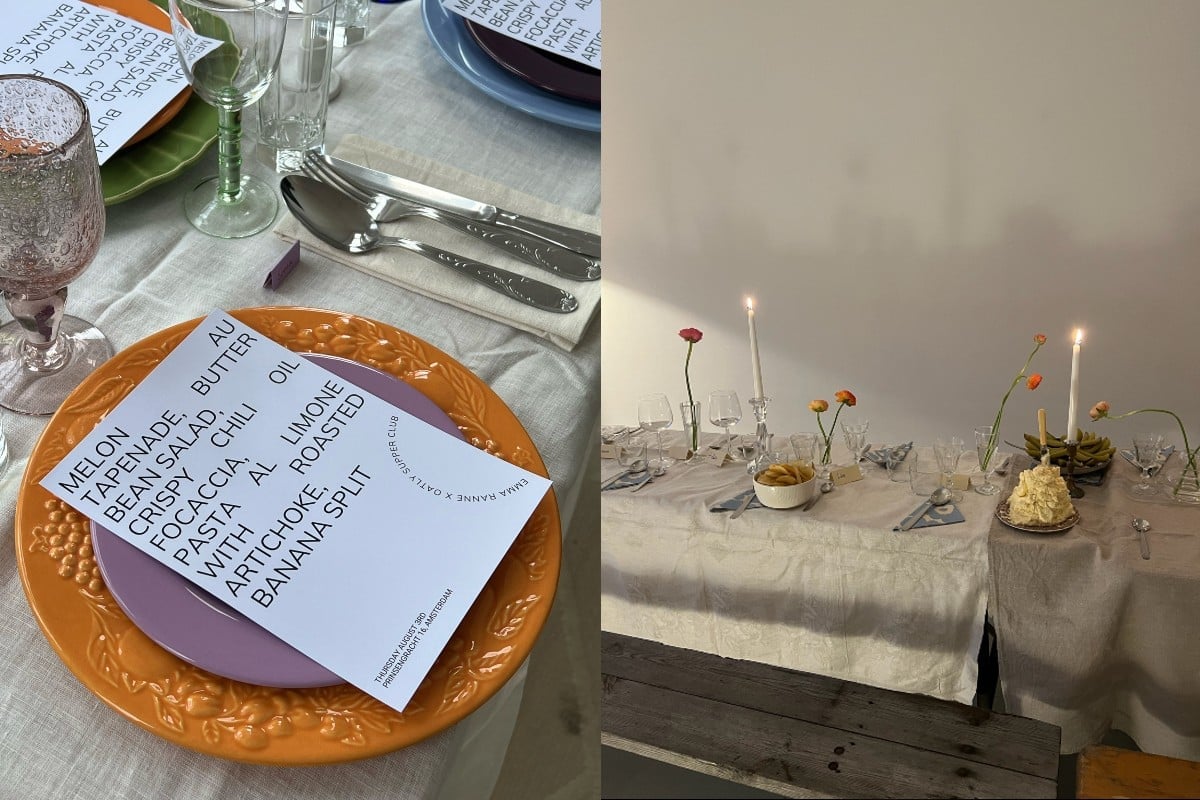
Image credit: @emma.rane
“Eating together is such a familiar activity for most of us that it becomes almost automatic, like going into autopilot mode,” she adds. “I feel like the comfort and familiarity of the activity itself helps the supper club guests forget that they don’t know each other yet.”
For Chloe Walsh, an LA-based home cook and supper club host, it’s overhearing strangers happily chatting together over the food she’s made that brings her the most joy. Like Emma and Julia, she’s been gathering unfamiliar faces around her table for years, driven by a love of cooking and the opportunity to curate an entire vibe—from the music and the lighting to the table setting. Her food would undoubtedly hold its own in a restaurant, yet she believes people attending supper clubs aren’t seeking restaurant-level food. “I think the draw to supper clubs, and my food in general, is that it is simple yet well executed and always extremely delicious,” she says. “Homey and rustic, but still elegant.”
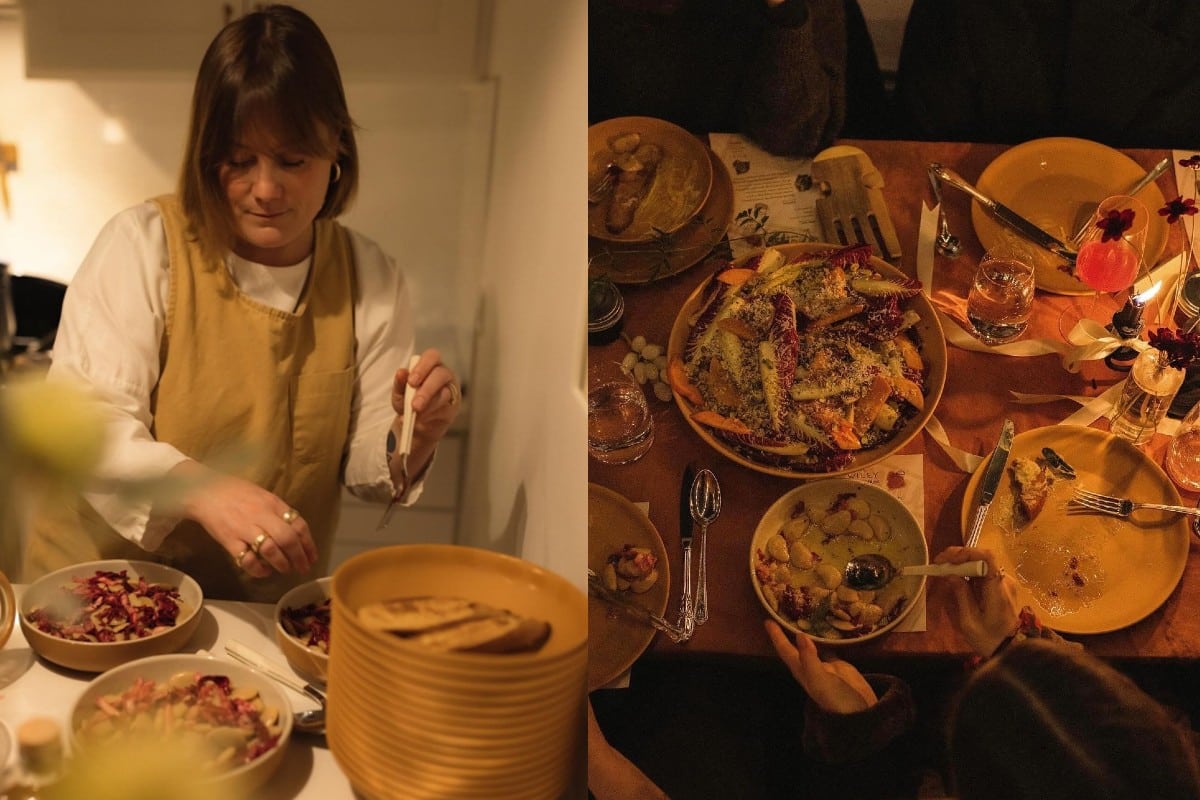
Image credit: @chloecooks___
Chloe’s supper clubs are warm, relaxed and fun, and are always held in her own home. While inviting strangers into her space was “a little daunting at first, especially for [her] husband” her fears soon dissipated. “I realised that people buying tickets to eat my food are more than likely going to be there just for the food and fun, and so that made me feel a lot more at ease,” she says. “It gets easier every time.”
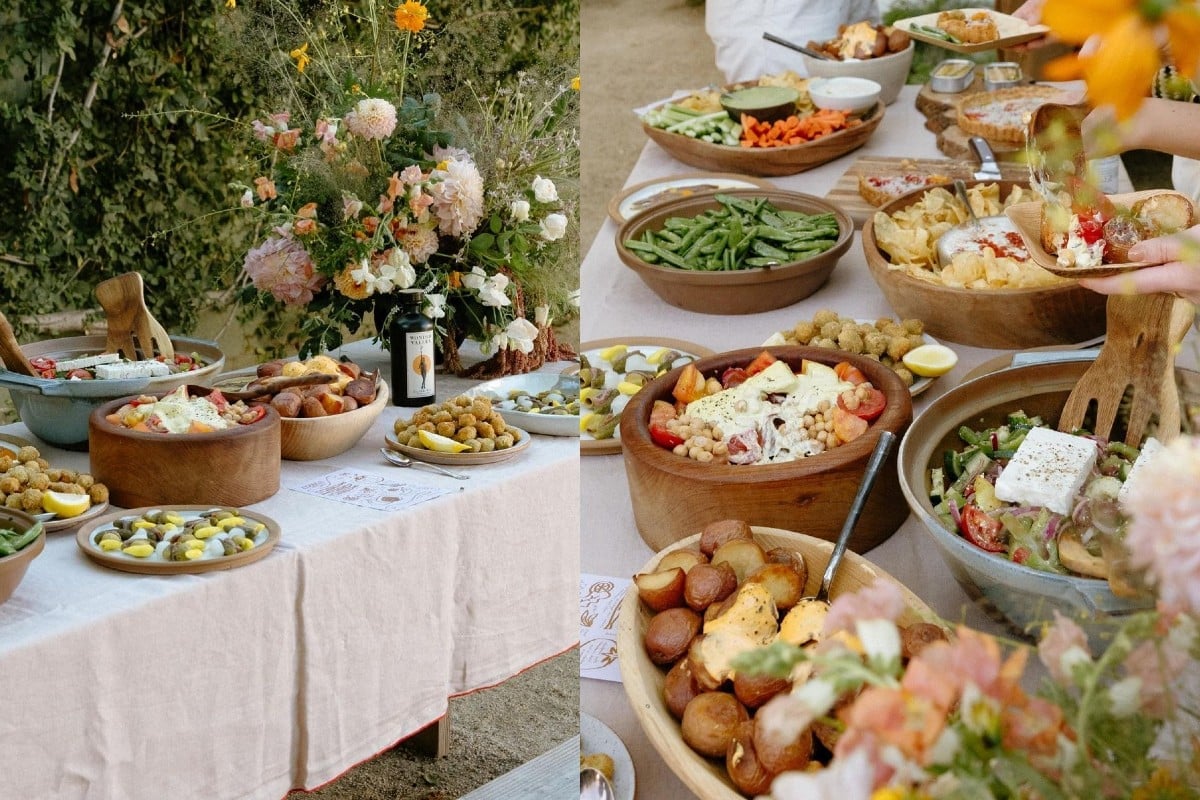
Image credit: @chloecooks___
“The conversations are different, more intimate, in a supper club setting than a restaurant,” she concludes. “It’s so wonderful to look around and see everyone chatting together and laughing... I mean, when else do you get a chance to dine with complete strangers?”



